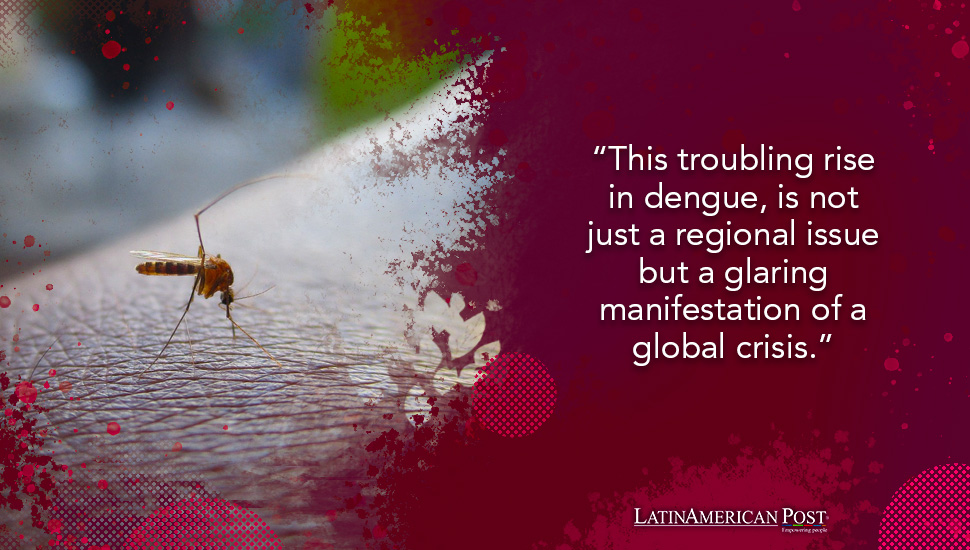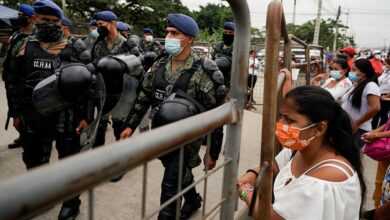Climate Change Fuels the Dengue Crisis in South America

As dengue cases surge in South America, climate change’s role in expanding mosquito breeding grounds becomes increasingly evident, triggering a global health crisis.
A Global Health Crisis Unfolding in South America
The surge in dengue cases across South America, notably in countries like Brazil and Argentina, is a grim reminder of the intricate links between climate change and public health. This troubling rise in dengue, a mosquito-borne disease, is not just a regional issue but a glaring manifestation of a global crisis. The expansion of mosquito breeding areas, driven by climate change, is exacerbating the situation in the Americas and raising alarms worldwide.
In 2023, Argentina recorded a sharp increase in dengue cases, a disease endemic to much of Latin America. Brazil, too, has seen a dramatic rise in cases, leading it to become the first country to offer a dengue vaccine through its public health system. These countries, along with Paraguay and Uruguay, are battling a foe becoming increasingly formidable due to changing climatic conditions.
Dengue is transmitted by the Aedes aegypti mosquito. It can range from being asymptomatic to causing severe illness and even death. The disease follows a seasonal pattern, with most cases in the southern hemisphere occurring in the first part of the year, coinciding with the summer months of December to February. These months bring the ideal hot and humid conditions for mosquitoes to breed, thereby facilitating the spread of dengue.
Climate Change Amplifies Mosquito-Borne Threat
The link between climate change and the increased range of mosquito breeding is clear and alarming. Rising temperatures, altered precipitation patterns, and extreme weather events like El Niño have created perfect breeding grounds for mosquitoes. These conditions are not limited to the Americas; they are a global phenomenon. As the planet warms, previously unsuitable regions for mosquito breeding are now facing an increased risk of dengue outbreaks.
This expansion of mosquito habitats due to climate change is a significant public health concern. The Pan American Health Organization (PAHO) reports that the incidence of dengue in the Americas has been on a steady rise over the past four decades. In the 1980s, there were 1.5 million cumulative cases, which soared to 16.2 million in the 2010-2019 decade. The year 2013 was marked as an epidemic year in the Americas, with 2 million cases, and the situation has only worsened since then.
Record Numbers and Growing Risk: Dengue’s Alarming Impact
The data is startling: the Americas saw a record number of dengue cases last year, surpassing the previous record set in 2019. Approximately 500 million people in the region are now at risk of dengue, a stark increase from the past. The four dengue serotypes are circulating throughout the Americas. In some countries, they are present simultaneously, increasing the risk of severe dengue and death.
The Aedes aegypti mosquito, the primary vector for dengue, is now widely distributed in the Americas. This distribution is a direct consequence of the changing climate. Warmer temperatures increase the mosquito’s lifespan, while more frequent and intense rainfalls provide ample breeding sites. These changing environmental conditions have allowed the mosquito to expand its range, bringing the risk of dengue to previously unaffected areas.
Dengue, Climate Change, and Public Health Systems
The situation in South America is a microcosm of a more significant global issue. As the climate changes, the risk of mosquito-borne diseases like dengue will only increase. This poses a considerable challenge to public health systems worldwide, especially in regions already struggling with limited resources.
What is needed is a concerted global effort to tackle this issue. While local interventions like insecticide spraying and public health campaigns are crucial, more is required. The root cause of this expanding threat – climate change – must be addressed. This needs a multifaceted approach, including reducing greenhouse gas emissions, investing in renewable energy, and adapting urban planning to mitigate mosquito breeding sites.
Evolution of Public Health Strategies: Adapting to a Changing Threat
Moreover, public health strategies must evolve to meet this changing threat. This includes investing in research to better understand the changing behaviors of mosquitoes, developing more effective mosquito control measures, and improving surveillance systems to detect and respond to outbreaks more efficiently.
The surge in dengue cases in South America is a call to action. It highlights the urgent need for the global community to unite in combating climate change and safeguarding public health. As the range of mosquitoes continues to expand, our efforts to control these vectors and the diseases they carry must also grow. The fight against dengue is not just a health issue but a crucial aspect of the broader battle against climate change.
Also read: Miami’s Language Shift is a Threat to Hispanic Cultural Heritage
The dengue crisis in South America and its escalation due to climate change is a stark reminder of the interconnectedness of our world. The expansion of mosquito breeding grounds is a direct consequence of a warming planet and a warning sign of the broader impacts of climate change on global health.





